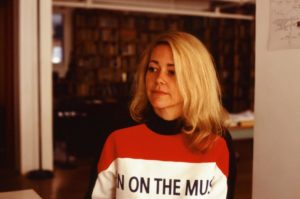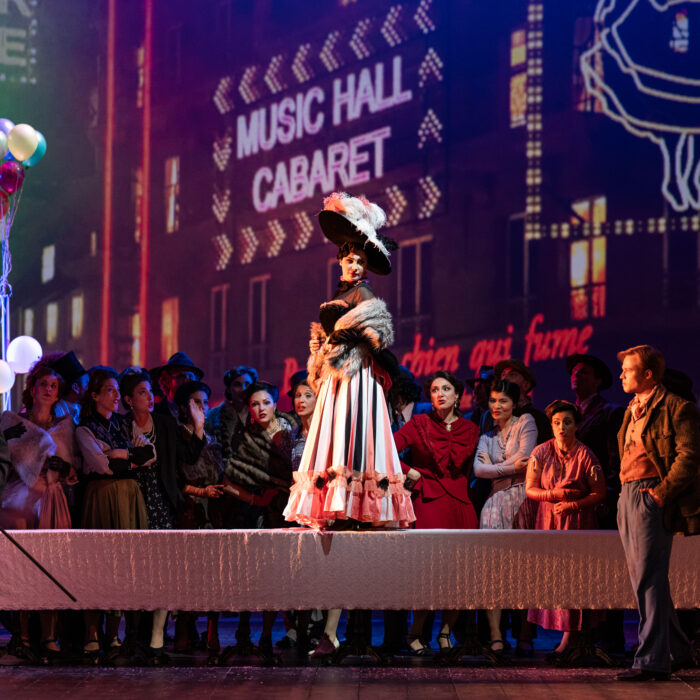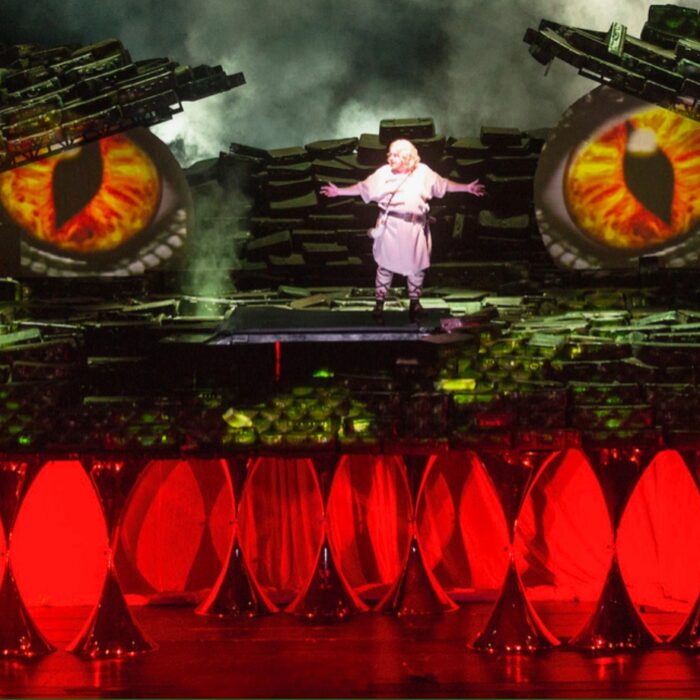
Metropolitan Opera 2023-24 Review: The Hours
Examining a Revival’s Message About How Time Heals Nothing and No One
By Jennifer Pyron(Photos: Evan Zimmerman / Met Opera)
The Metropolitan Opera presented the tenth performance of composer Kevin Puts’s “The Hours,” with libretto by Greg Pierce, on Friday, May 10th 2024.
In November 2022, OperaWire reviewed “The Hours” debut with great attention towards how the opera came to the Met, including Kevin Puts’s score, Greg Pierce’s libretto, and the undeniable beauty of the “sweeping vocal passages that draw from German romantics like Strauss and Wagner.” However, for this year’s revival review, OperaWire will examine the psychological underpinnings of the three main female characters, Clarissa Vaughan (soprano Renée Fleming), Virginia Woolf (mezzo-soprano Joyce DiDonato), and Laura Brown (soprano Kelli O’Hara), in relationship to the opera’s production and how their stories and voices are interconnected.
It is also important to note for this production, Kensho Watanabe returned to the podium as conductor and the cast included remarkable performances by soprano Kathleen Kim (Barbara / Mrs. Latch), soprano Sylvia D’Eramo (Kitty / Vanessa), mezzo-soprano Denyce Graves (Sally), countertenor John Holiday (Man Under Arch / Hotel Clerk), tenor William Burden (Louis, Richard’s ex-boyfriend), tenor Sean Panikkar (Leonard Woolf), bass-baritone Kyle Ketelsen (Richard), and bass-baritone Brandon Cedel (Dan Brown).
The Graduates of the Lindemann Young Artist Development Program included singers Sylvia D’Eramo, Tony Stevenson, and Brandon Cedel, in addition to Musical Preparers Howard Watkins, Caren Levine, Bryan Wagorn and Katelan Trần Terrell.
Production Perspective
Producer Phelim McDermott is well-known for clearly and concisely expressing symbolism as a process of synthesis. And his productions depict the emotionally abstract as a means to one’s evolution. In other words, what happens on the stage in a McDermott production is in direct correlation to the synopsis on both a surface level and beyond. In this sense, “The Hours” felt like a playground for McDermott to explore the conjunctions between all three main characters, Clarissa Vaughan, Virginia Woolf, and Laura Brown. However, the overt nature of the production gave these three characters limited environments to maneuver around the widening gap of the genuine discomfort they felt towards a reduced way of life that is the male gaze.
Romanticizing women as opera characters deemed responsible for carrying forward false hopes of overcoming the reality of depression, specifically postpartum depression, and all other forms of complex mental adversities that are very real and common is a point of contention for me. “The Hours” stems directly from Virginia Woolf’s book, “Mrs. Dalloway,” and was made into a film based on the novel by American author Michael Cunningham. What makes the opera production vividly aware of both these influences is how McDermott personifies the women as walking a tightrope suspended between both worlds – that of a female in a female experience while merely surviving in a male-dominated world.
It is fascinating how the production’s muted lighting by Bruno Poet and uncomplicated set and costume designs by Tom Pye also contributed to easing this harsh reality. The projection designs by Finn Ross created an ethereal element to match. And there were moments where one might have felt numbed by the lack of choices given to each woman in the libretto to actually, fully be herself. Instead of permeating the veil that drove the majority of this opera further into a mystified arms-up response to the devastating effects of mental adversity, and even more so, the complete lack of awareness around suicide as a final act done by someone who sees no way out was disheartening.
“The Hours” is soul-stirring and a message about how time heals nothing and no one. One might have wished for the production to have been less straightforward when implying how a woman might feel in certain situations and more open to the natural interpretations that can arise when there is room to breathe and be with each character as she wants to be, like when Virginia Woolf wanted to move to the city and her husband stopped her, or when Laura Brown kissed Kitty in the kitchen out of severe desperation to feel something, anything, ANYONE, that could pull her out of her own mind’s spiral. The gathering of flowers by Clarissa Vaughan was also an overdone emphasis on female fertility and birthing new hope forward. The fact is that all three women were at the pits of who they were based on who they were becoming, and the production might have felt limited in a minimalist response of creating space for them.
Phelim McDermott’s production is stunning, and this review is just asking about another realm of perspective to consider when developing the storyline of three women who radicalize their own existences in order to live, not die, another day in an oppressive environment as seen through the male gaze.
“The Hours” opera is a call for more to be considered and concerned. And this is a very good thing.

Musical Highlights
Kevin Puts’s score is absolutely breathtaking. I could not stop myself from turning to my friend next to me and saying so. Just when one thinks it could not get any better, it does. In fact, the determination of how beautiful it is can be heard and seen by the singers’ voices and the natural response their bodies made when singing their roles. Everyone was in love with what they were singing and why they were singing it.
Renée Fleming as Clarissa Vaughan was in her element for the entire opera. Her voice lifted and lavishly laid out every note and word as though her character was a singer herself. One could see the joy and vitality present in Fleming’s eyes as she performed. There was a sense of timelessness pulsating through her that made Clarissa vibrantly come to life and specifically into love for her dear friend Richard who adored her. This might be one of Fleming’s most natural and necessary turning points in her career as she is one of the greatest sopranos in opera still very much interested in trying out new ideas and supporting new works like this one by Kevin Puts. Fleming’s unabashed admiration for “The Hours” and her sharing this production at the Met in her reprisal role is greatly appreciated and proved very well-received at the final curtain call.

Mezzo-soprano Joyce DiDonato as Virginia Woolf exemplifies her ability to become the role she is given, and to take it beyond what is expected. DiDonato has this otherworldly capacity to host the inner workings of Virginia Woolf so much so, that one might have felt they were witnessing Woolf sing opera for the first time. It was electrifying to witness DiDonato in this serious role and especially to feel her sing forth the fiery guts of Woolf as the blazing pioneer that she was and still is for so many of us. The moment when she is by the water and finds herself inching closer to its seemingly bottomless abyss was so shocking to me that I leaned forward in my seat and wanted to pull her back myself. DiDonato’s losing herself in the role of Virginia Woolf is the discovery of finding herself as the legendary human being she is.

Kelli O’Hara as Laura Brown is unsettling and unnerving to the point that her character deems to make in this opera. O’Hara’s performance left me wanting more, way more. And again, this is a good thing. “The Hours” opera never fully realizes Laura Brown and this stunts the development of O’Hara’s wonderful ability to express joy through her own voice. Her high notes came across as frail and fleeting, but this could also be attributed to Laura Brown’s own diminishing spirit as she suffocated quietly by herself as a 1950’s suburban housewife who went to a hotel to almost commit suicide. There were several moments when O’Hara was singing that tears flowed down my face out of the excruciating relatability that O’Hara provided when “trying” to rationalize her complacency, confusion, anxiety, depression, and gut-wrenching turmoil of life as a woman unable to truly live. Kelli O’Hara’s voice strengthened as the opera developed and the libretto had her meeting both Clarissa Vaughan and Virginia Woolf at the end, but I will never forget O’Hara’s attention to detail and the care and concern towards anyone contemplating suicide as a means to escape their own reality.

I also want to share how the ending made me feel when the trio, including Clarissa Vaughan, Virginia Woolf, and Laura Brown, meet and sing about how they must live on in the face of mental adversities. For me, this making sense of the dark in a light way vastly reduces the power of what this opera is about. The reality is time (the hours) heals nothing and reveals everything at the same time. In my opinion, the core of all three women resonated with this fact up until the trio. The means of expressing grief through a kumbaya gathering took away so much of what I was feeling for this opera and these women and their vulnerability. It just did not sit well with my soul.
Sometimes saying less says more, especially in music.
Stellar Conducting & More Cast Highlights
Conductor Kensho Watanabe led the orchestra and cast members with effervescent amounts of grace and gratitude. Watanabe’s natural gift of channeling Kevin Puts’s music is astounding and it’s no wonder he was at the podium again. The swelling emotional rollercoaster that drives this score was like a bloodline extending from Watanabe. There was no separating what he was doing from any part of this whole production, and his signature frequency carried through in development with every role and turning point of the synopsis. It’s also important to note how Watanabe’s intuitive ability to proactively extend his energy toward the singers made every entrance feel very aligned and actively engaged. This contributed greatly to the music’s energy and never once did it feel like the opera was stagnating or losing momentum in its ability to freely flow.
Soprano Kathleen Kim as Barbara and Mrs. Latch was stunning. Her voice and stage presence lit up the entire opera. I hope to see more of her performances in the future, especially in bigger roles. Soprano Sylvia D’Eramo as Kitty and Vanessa sang with conviction and an edginess that especially made Kitty believable and fantastical at the same time. D’Eramo’s voice and acting abilities are knock-out when given the space to unfurl. Mezzo-soprano Denyce Graves as Sally performed with a matter-of-factness that grounded this opera in a lot of ways. Graves looked and sounded very comfortable in her role, and most especially within the context of managing so many things at once. Her voice never faltered in its clarity and complexity.
Countertenor John Holiday as Man Under Arch and Hotel Clerk was like a breath of fresh air. His voice carried the most beautiful resonance and everyone in the audience sat up in their seats when he sang. Holiday is a fast-rising star that should be on everyone’s radar to experience live.
Bass-baritone Kyle Ketelsen as Richard was perfect in his role and one could tell he was enjoying every moment. In the context of Richard’s very tragic life, Ketelsen showed extreme amounts of care and connection with his ultimate message surrounding the unexplainable mysteries of life and death. The moment when Clarissa (Renée Fleming) races to grab the book Richard (Kyle Ketelsen) tosses onto the couch just before he falls out the window to his death was excruciatingly real. The entire audience gasped and there was a silence that lingered in the midst. His crouching body in the window is permanently etched in my mind’s eye.

Tenor William Burden as Louis, Richard’s ex, sang with conviction and gusto. His bright tenor carried all the way to the back of the Met’s house. There was a thrilling sense of power in his presence. Tenor Sean Panikkar as Leonard Woolf, Virginia Woolf’s husband, expressed his role with a sense of urgency and ultimatum that made him that much more oppressive and overprotective. Panikkar was exactly what one might imagine Leonard Woolf to be.
Bass-baritone Brandon Cedel as Dan Brown, Laura Brown’s husband, did a stellar job at charming and coercing Laura (Kelli O’Hara) into submissiveness as a dutiful suburban housewife. Cedel’s glorious bass-baritone was full and bright. His mannerisms were appropriately demeaning as he cascaded in and out of the kitchenette area, making his wife feel as though she was behind in some way or another, yet again. His smile was glowing as he picked up their young son Richie (Michael Hurst) and brilliantly personified another male hero in the making. Michael Hurst did an excellent job singing and acting in this very heavy opera as a young singer. His voice was a lightness in the heaviest parts of all.
Choreographer Annie-B Parson made this opera as believable and beautiful as it was and will ever be. Her work with St. Vincent for “Broken Man” is one of my all-time favorites. The pure and simple movements of Parson’s choreography made “The Hours” feel like a soothing salve for the mind, body, and soul. The dancers were phenomenal in how they lucidly imagined what Clarissa, Virginia, and Laura, a lot of times, could not voice out loud.
This sense of floating in music amidst the chaos, connecting back to the body, and holding awareness for the reality of everything that is life (and eventual death) will always be what I choose to remember when I think of Kevin Puts’s “The Hours.”



